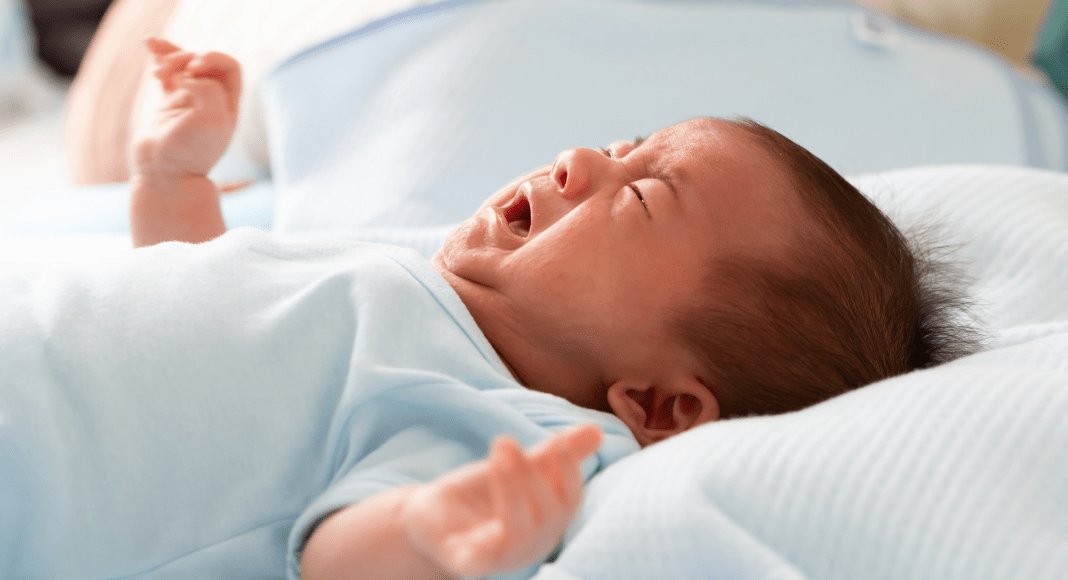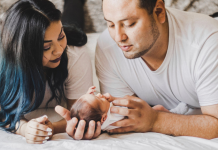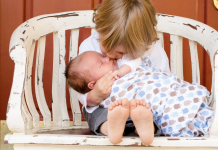 One of the toughest challenges I faced as a new mom was not being able to put my baby down. Well, I could’ve put him down but then he’d cry bloody murder until I picked him back up. He was only happy being held by me — his devoted Milk Maiden — and I was only content holding him, thanks to my crippling postpartum depression and anxiety.
One of the toughest challenges I faced as a new mom was not being able to put my baby down. Well, I could’ve put him down but then he’d cry bloody murder until I picked him back up. He was only happy being held by me — his devoted Milk Maiden — and I was only content holding him, thanks to my crippling postpartum depression and anxiety.
Adjusting to motherhood was intense. I wasn’t prepared for the sleep deprivation, the isolation, and the feeling that my time was no longer mine. I definitely wasn’t prepared for the amount of crying that would come out of my tiny boy. The pediatrician told us he had colic, a garbage diagnosis with no cure. We were told he’d grow out of it. He’s 10 now, so I guess he did.
In the meantime, only one remedy would pacify him (hint: it wasn’t a pacifier). It was his mama’s loving arms. And occasionally his daddy’s.
He wasn’t keen on babywearing. He despised his Ergobaby. He thought his Tula was trash and his Solly was silly. He considered it cheating if we tried to use carriers or slings or wraps. He wanted the real deal: arms. Straight up arms.
Other things he hated: the crib, the play gym, the Pack ‘n Play, the Rock ‘n Play, the swing, the tub. Shall I go on? Clearly, these things do not have human arms.
Sometimes I wondered how his colic came to be. Did he have something important to say and the inconsolable crying was his only method of communication? Was he suffering from pain or boredom or disturbing daydreams? Had he scored “difficult/temperamental” on those baby personality quizzes?
 The explanation that made the most sense to me was that it was my fault. I was sure my postnatal state of mind was to blame.
The explanation that made the most sense to me was that it was my fault. I was sure my postnatal state of mind was to blame.
My postpartum anxiety came on within minutes of his birth. He came out and I was already worried about us being apart. I was already ruminating on going back to work and leaving him at daycare with people I didn’t know for nine or 10 hours a day. How could I possibly be a good mother if I wasn’t around to nurture him and keep him safe from all of the bad things in this world?! Not a great way to dive into motherhood.
I figured he could smell my fear or sense that I was constantly on edge. Did my breast milk contain neurotic hormones? Was I feeding him a steady diet of liquid depression? Did it work like that?! I felt unsure about my ability to mother him properly.
Whereas some depressed new moms have trouble bonding with their babies, I did the opposite. We became fully enmeshed. I wouldn’t let him out of my sight. Sometimes I wouldn’t even give him up to my husband to cuddle. I’d spend hours each day just looking at him and crying because I loved him so much and was dreading the day we’d be apart. I needed him on me at all times or else I’d come (more) unglued. He was my security blanket and I was his.
No wonder he got so attached to being in my arms. That’s where he always was.
I needed him and he needed me, and we were a codependent hot mess together. After six months of this, I realized my experience wasn’t typical or healthy, so I sought out treatment and things turned around for us.
Thank you, Zoloft!
Eventually, my anxiety dissipated and my days became brighter. As I started to feel better I didn’t need our son in my arms quite as much. I still loved holding him because he was my baby but I didn’t need him in my arms as if he were a dose of Xanax.
It felt nice to hold him by choice, not out of necessity.
It took a little longer for him to come around to the new normal. I’d try to put him down in his play gym and he’d look up at me with concerned eyes and a wobbly chin, moments away from exploding into tears. “Mama,” he’d plead with me, “I didn’t get the memo that we weren’t doing this 24/7 holding thing anymore.” Cue meltdown.
 Thankfully my improvement coincided with him learning how to crawl, then cruise, then walk. Once he discovered his own movement, he wasn’t as adamant about being held. He became more interested in tearing up the house and climbing on everything like a miniature mountain goat.
Thankfully my improvement coincided with him learning how to crawl, then cruise, then walk. Once he discovered his own movement, he wasn’t as adamant about being held. He became more interested in tearing up the house and climbing on everything like a miniature mountain goat.
We both came to enjoy our newfound independence yet still made snuggle time a priority. Our obsession with each other gave way to a more comfortable, balanced, and manageable love. My start to motherhood was rocky, and I’ll never really know if my postpartum depression and anxiety were responsible for my son’s colic or vice versa. I guess it doesn’t really matter. What does matter is that we got through it and bonded as tightly as a mama and baby can.













